Windows 8, Windows Phone 8 and a 7” gap that needs to be filled
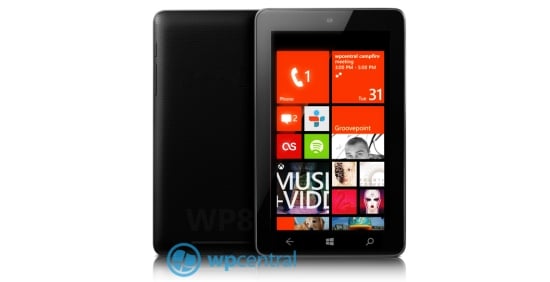
For a long time, Windows Phone users have speculated about the possibility of a Tablet based on the OS. It never happened, but even now, I’m left wondering if Windows Phone is the more capable and desirable portable computing experience.
Microsoft are on the cusp of releasing Windows 8 and with it we see the software giant plunging head first into the world of true mobile computing. They have dug in deep and hammered away at the core of Windows to enable new, mobile orientated computing experiences. At the same time we also have Windows Phone 8 getting ready for primetime. Windows Phone is now reaching its first major upgrade, and it's about to fully mature.
Given the right form factor it's an OS that could work better as a tablet than Windows 8, and here is why...
Microsoft has sought to enable Windows 8 to live on as a mobile operating system, going to great lengths to enable fast boot times along with extreme data and power savings. We now have the touch-friendly WinRT environment in which to run apps and access a marketplace experience. The move to a fully mobile OS is certainly around the corner, but Windows 8 will not be it, it has more weight to lose before that really happens as there remain some fundamental issues with Windows 8 as a mobile operating system. At the heart of Windows lays the control panel, take one look at it and compare it to its touch counterpart and you’ll see how far they need to go to bring Windows kicking and screaming to the world of touch. Using Windows 8 as a touch-only OS still requires occasional trips to the desktop.
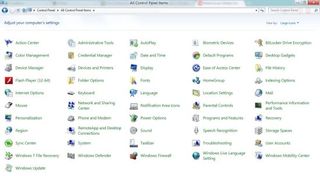
The good old Windows Control Panel, lots and lots of options...
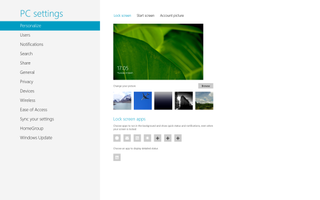
Built for touch but lacking many options
While I don’t mind it too much (only because as a long time Windows user) I expect to do things in the desktop environment. Until the need to go to a desktop is removed by providing enough core functionality to be accessed all from WinRT, the desktop will persist as an essential part of the OS. Until we see versions of Office that run as touch-only MX variants the desktop is where we will need to go to use the excellent productivity suite.
Get the Windows Central Newsletter
All the latest news, reviews, and guides for Windows and Xbox diehards.
I happen to really like many things about Windows 8 and know that this version is a difficult first step, one that I think Microsoft have bravely taken. Being a Windows guy, I’ll be the first in line when it comes to getting a Windows 8 based tablet, my reasons for that will be apparent later.

Voice Un-recognition?
One of the more surprising things about Windows 8 is there exists no built-in speech technology (something OSX Mountain Lion just introduced). Sure, hidden in the depths of classic Windows lives some speech recognition software, but this is not anything like TellMe in Windows Phone. It's an application you can train to understand your voice and use for dictation and offers some verbal control over the computer, and is quite good, but it's not in the same spirit as Tellme.
Windows Phone 7.5 upon pressing and holding the Windows key will produce a myriad of speech-driven options. Call a person, find something, open an app, send a text and some other fancy stuff. Even the Xbox 360 has Tellme built in, but omitted it from Windows 8, that seems odd considering Tellme was touted to be included at one point. Typing on glass is acceptable, but being able to speak to your computing device where it makes sense can be both powerful and compelling part of a mobile experience.
Windows Phone 8 will be expanding that speech functionality even further. Question is, if Microsoft wanted Windows 8 to be a mobile OS why isn’t its core speech technology front and centre? We would presume that tablet users might like to use their device in a car. Without speech built into the DNA of the OS, it will mean applications that use speech will do so independently rather than fully integrated, system wide experiences. Scenarios like verbally replying to an email, launching a location specific app or finding something close to you for instance. These situations simply will not be possible with Windows 8 unless there is an app created to mimic those functions. It seems a glaring omission from an otherwise capable mobile OS. Could TellMe functionality be coming later? Doubtful but it is a possibility.
Telephony support
The tablet/mobile line is drawn most notably when you look at Windows 8 mobile credentials, it simply has no inherent ability to make and receive calls. Microsoft, quite rightly don’t have any form of dialer or mobile phone functions in Windows 8 other than its ability to use a mobile data package. That functionality has been left to Windows Phone, which along with its integrated speech technology allows someone to say “Call Mum Mobile” forcing the phone to look up your contacts and dial a number. As a general rule most of us wouldn’t choose to use our tablet as a phone per se, but if the tablet had that core experience at its heart it could be useful in some situations.
As Windows Phone users, we have effectively been using a superior version of Windows 8 for a while now. The UI on Windows Phone is beautiful, making it the winner of design awards and loved by those with an eye for typography. Windows 8 has elements of those ideas but its a very distant cousin. There are so many bizarre UI decisions in Windows 8, it’s hard to know where to start, but having to swipe up to simply reveal basic controls to move emails, mark as unread or sync/refresh doesn’t feel quick or intuitive as it should be. That could change, the core apps are still in flux so there is hope, as it stands many of the functions of apps and the OS itself keep themselves hidden. At times this leads to real confusion or simply more swiping and pressing to get stuff done. Many of Windows Phone's core app user experiences remain head and shoulders above Windows 8. Perhaps the premise of one-handed use leads to some better design choices.
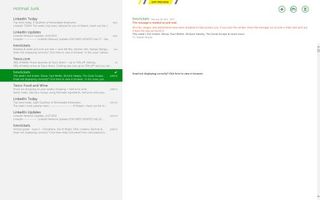
Its a clean UI, but why the need to swipe up to reveal common buttons?
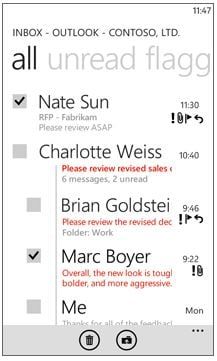
Common buttons are show in Windows Phone.
WP8 Offers Exciting New specifications
Windows Phone 8 is just around the corner and with it come some new hardware and possibly new form factors. At the top-end, WP8 will be able to support a maximum screen resolution of 1280 x 720. The Lenovo-X200 I’m running windows 8 on has a maximum screen resolution of 1280x800 on its 12” screen. WP8 will also be fully multi-core CPU aware, meaning dual cores will be standard. A high-end WP8 device could potentially be more powerful than my laptop.
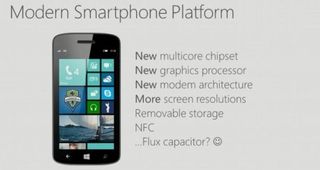
Along with all the reasons why Windows 8 isn’t a fully mobile OS, there are heaps of reasons why Windows Phone 8 can still have a crack at being a tablet OS. WP8 will have a ready-made catalogue of applications, 100,000 to be exact. Its going to have an advanced version of Tellme technology along with NFC and some fancy new Direct X gaming technology.
At present, we are seeing signs of life with Windows 8 tablets. The Surface tablet looks stunning and Lenovo are just now airing their Thinkpad 2 designs. Whilst these are good-looking devices, they are going to come with a heap of caveats. The first is cost. For the truly all singing and dancing Intel based versions they are not going to be cheap. Secondly, there is still much we don’t know about performance and battery time. It's unlikely to be as thrifty with power as WP8. Thirdly, that 10” starting size might not be the sweet spot for tablets. We are seeing giant phones from Samsung, fitting somewhere in between tablets and phones and consumers are buying them.
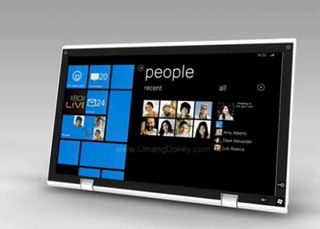
There is a 7” gap where a Windows Phone tablet could thrive
The Nexus 7 and Kindle Fire represent that new middle ground in portability, Windows 8 tablets wont reach that form factor, at least not yet. I see this size as a clear win for a Windows Phone tablet. So, will we see mini tablets based on Windows Phone 8? I certainly hope so, there are plenty of reasons I don’t want my tablet experience to mean mind numbing flip flops between WinRT and Windows Explorer.
Whilst many of us will be getting a Surface tablet, it will be to replace a laptop not my iPad. There is a huge gaping hole for a device that can be used to watch movies on planes, provide a huge display for in car navigation and importantly respond to voice commands. Windows Phone 8 could and should at least try to fill this gap, it’s a market still in flux and one not yet occupied by the iPad.
The question remains, will Microsoft even allow vendors the chance to make these mini tablets? By allowing Nokia or Samsung to make a 7” Windows Phone, will they upset the waters of their fledgling Windows 8 tablets? Making a Windows Phone tablet could really upset the balance of how people perceive both Windows Phone and Windows 8.
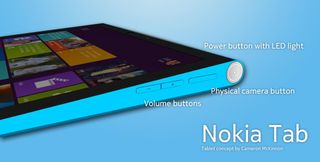
Merely a concept
We have seen a little slide from Nokia showing some potential new form factors for Windows Phone, many have drooled over the notion of a Lumia tablet. If Nokia did make a tablet, why would it run the distinctly non-phone orientated Windows 8? Nokia would surely like to play to their advantages with a true mobile OS, not jump into the PC making game. They have great relationships with mobile operators, they understand what it means to be mobile. If a Lumia tablet were a real prospect, wouldn’t it just be better if it ran Windows Phone? It would then have all the advantages that the phone OS brings and comes in a handy 7” package.
The prospect of a 7” device running Windows Phone 8 is certainly appealing. But what do you think? Will one of Microsoft's partners make one? Would Microsoft allow it? Would you buy one or stick to getting a Wi-Fi Only Surface? We’d love to hear your thoughts.
